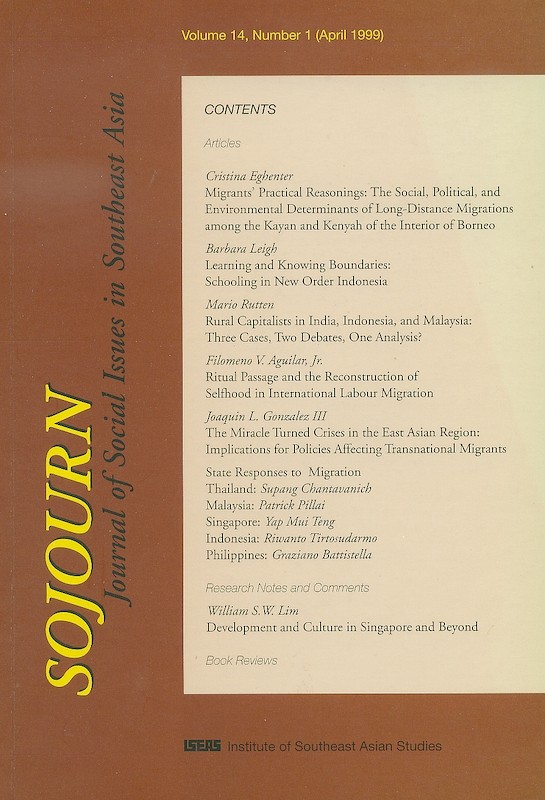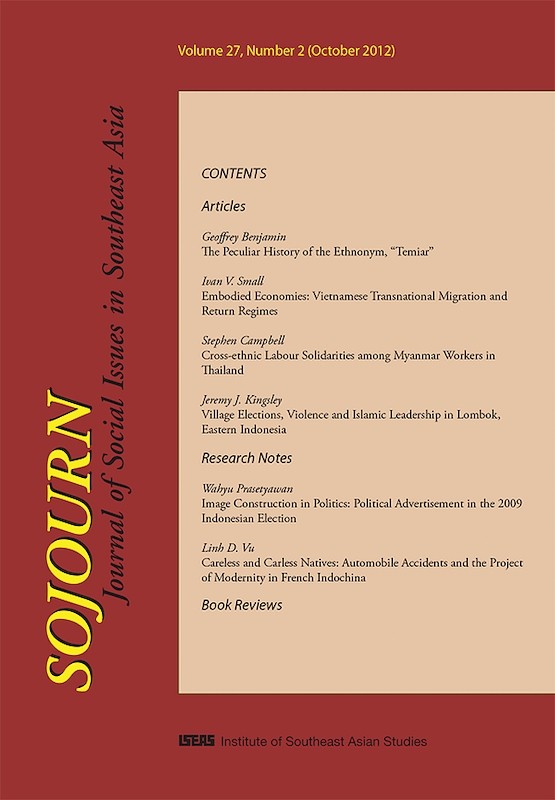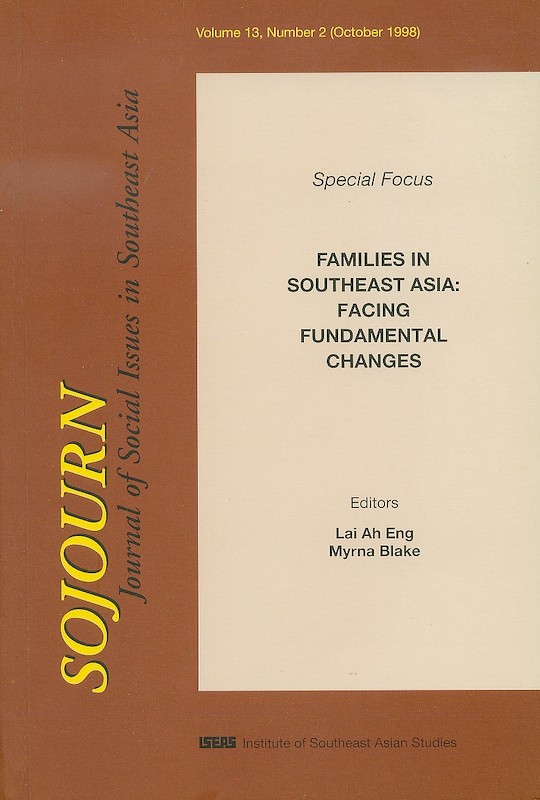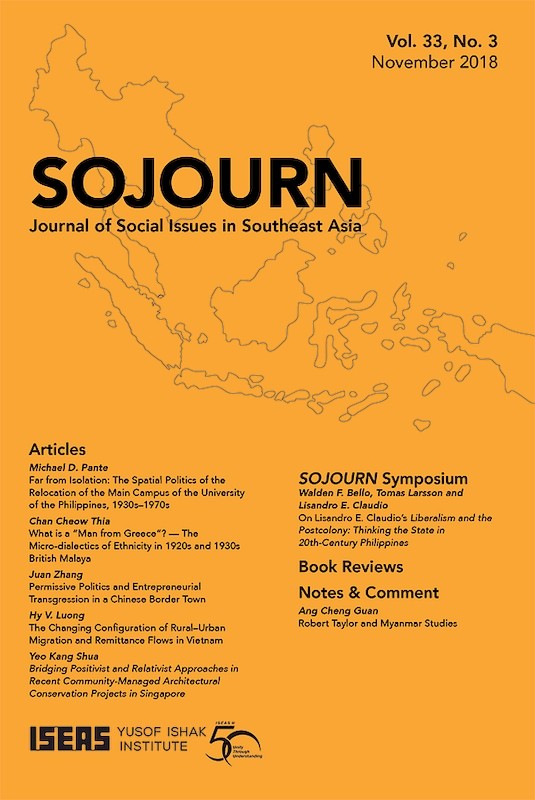SOJOURN: Journal of Social Issues in Southeast Asia Vol. 14/1 (Apr 1999)

Date of publication:
April 1999
Publisher:
Institute of Southeast Asian Studies
Number of pages:
274
Code:
SJ14/1
Contents
-
Preliminary pages, with Editorial Note
-
Migrants' Practical Reasonings: The Social, Political, and Environmental Determinants of Long-Distance Migrations among the Kayan and Kenyah of the Interior of Borneo, by Cristina Eghenter, author see abstractThis paper focuses on the decision-making environment of the Kayan and Kenyah migrants who moved out of the interior of Borneo in the period after Indonesia's independence. It uses reconstructions of migration episodes combined with historical sources to describe the environmental, social, political, and psychological determinants of the migrants decision to migrate and the ways they organized the move. Following Hawthorns discussion of practical reasonings and other works that stress the importance of context for a causal analysis of human actions, the paper argues that any explanation of the decision to migrate needs to consider the contextual scope of the migrants within which they define their possibilities for action. There is also a need to provide a convincing account of why, given the migrants understanding of the situation, particular courses of action were taken.
-
Learning and Knowing Boundaries: Schooling in New Order Indonesia, by Barbara Leigh, author see abstractSchooling practices in Indonesia take place within a centrally structured educational bureaucracy. The paper focuses on primary and secondary schools, which have undergone rapid expansion since the oil boom of the early 1980s. Taking school examinations as sociological objects of study, there is an attempt to understand the students mental processes as they prepare for these determinative events. Every question in every subject has a correct answer within each sector of schooling through nationally legitimated curricula. Teachers and pupils know that schools are places where one learns by heart the requisite texts, whether they be in Mathematics, Bahasa Indonesia, Morals of Pancasila, or History. Whether students perceive the process as a game or reality, one result is the numbing (or perhaps multi-layering) of creative young minds at least during the time that the children are in school. Another result is the (often unconscious) learning of boundaries. The theoretical work of Pierre Bourdieu is used in the analysis.
-
Rural Capitalists in India, Indonesia, and Malaysia: Three Cases, Two Debates, One Analysis?, by Mario Rutten, author see abstractThere are divergent explanations but common empirical themes in the study of rural entrepreneurship in South and Southeast Asia. Most studies are based on empirical data collection in one country and present their data within an analytical framework that is specific to the particular Asian sub-region concerned. Studies on the entrepreneurial class in South Asia tend to focus on the structural aspects of entrepreneurial behaviour, while studies on the entrepreneurial class in Southeast Asia tend to focus on the cultural aspects of their behaviour. By comparing the findings of field-work among Hindu, Muslim, and Chinese rural capitalists in India, Indonesia, and Malaysia, this paper argues that there is sufficient common ground in the type of empirical subject studied for a unified, comparative framework to be developed which will give us a better understanding into the emergence of the entrepreneurial class in both South and Southeast Asia.
-
Ritual Passage and the Reconstruction of Selfhood in International Labour Migration, by Filomeno V Aguilar Jr, author see abstractThis paper reasserts the place of human agency amid the structural forces that seem to overdetermine international labour migration. To explore the meanings attached by migrants to overseas employment, the paper casts the workers experience as a type of ritual, a secular pilgrimage knowingly embarked upon by the individual in close dialectical relationship with the social world. Various stages of double liminality are endured by the migrant worker through the balm of commodities and the consumption of modernity, with the journey of achievement eventuating in a new sense of self. Empirical materials are drawn primarily from studies of Filipina and Filipino workers.
-
The Miracle Turned Crises in the East Asian Region: Implications for Policies Affecting Transnational Migrants, by Joaquin L Gonzalez III, author see abstractThis paper focuses on the policy implications of the current regional economic crisis to labour migration in Southeast Asia. It begins with an important description of the Asian miracle, followed by an examination of the critical, but underemphasized, role of labour migrants especially to the high-performing Asian economies (HPAEs). Thereafter, some initial policy implications of the regional crisis are examined.
-
Thailand's Responses to Transnational Migration during Economic Growth and Economic Downturn, by Supang Chantavanich, author see abstractThis paper first provides a brief overview of immigration into Thailand historically and particularly since the 1970s, and emigration from the country since the 1960s. It then examines migration policies pertaining to both flows, and shows that immigrants receive an unwelcome reaction from the state while Thai workers overseas receive state support. A third section examines issues arising from both flows, such as work conditions and welfare, recruitment practices, legality and documentation, and public response. The paper concludes with a discussion of economic contraction and the changing scenarios in transnational migration in Thailand.
-
The Malaysian State's Response to Migration, by Patrick Pillai, author see abstractThis paper first traces migration trends since 1970 in the context of economic growth and labour market development, and analyses the evolution of public policy as it reflects changing interests and concerns of the market, state, and society. It then examines the impact of the economic crisis on policy, including the simultaneous post-crisis deportation and new migrant inflows. It argues that while initial mobility is propelled by labour market forces, it is social networks and non-state economic actors such as the immigration industry which ensure migration sustainability and persistence, particularly against the backdrop of growing regional inequities. The paper concludes that the persistent and permanent nature of migrant entry and settlement demands a holistic state response, one able to maximize short-term economic gains and minimize long-term economic, social, and political costs.
-
The Singapore State's Response to Migration, by Yap Mui Teng, author see abstractThe paper first presents major migration trends that show how immigration has always been an important part of Singapore's demographic history since 1819 and is directly linked to its economic development. Issues in migration policy discussed show the state's particularly active role in influencing the flow of people into and out of the country, mainly for economic considerations. The final section discusses economic contraction and the impact on foreign labour dependence, and points out that while immigration will continue due to local and international factors, it needs to be managed carefully in the context of a small nation-state.
-
The Indonesian State's Response to Migration, by Riwanto Tirtosudarmo, author see abstractThis paper first sets emigration issues and policies within the historical context of Dutch colonial rule in which emigration from Java to the Outer Islands formed part of the Ethical Policy. This is followed by a discussion of post-colonial emigration policies in which out-migration from Java continues to remain a key agenda and which reflects the persistence of dominant state and lite interests. The discussion also shows how transmigration from Java to the Outer Islands evolved from being a welfare tool of solving problems of overpopulation, poverty, and landlessness in Java, to one of economic development and regionalization even as it has negatively impacted indigenous populations. A third section discusses the patterns and characteristics of the international migration of Indonesian workers within state development plans. The paper concludes with a discussion of state responses towards this international migration by Indonesian workers, and makes the point that exodus looks set to continue in the light of deepening economic and political crises in the country.
-
Philippine Migration Policy: Dilemmas of a Crisis, by Graziano Battistella, author see abstractThis paper first reviews the historical development of Filipino migration policy since the early 1970s, with the emphasis shifting from labour export to migration management and the privatization of migration. The main trends of migration in the 1990s are then documented, indicating an increase of Filipino migration to Asian countries, the decrease of first-time overseas workers, and the increase of female migration. The paper then focuses on the dilemmas posed by the economic crisis, such as over redeployment or re-integration, deployment or protection, and issues of deregulation and employment conditions. The paper concludes with an assessment of the limited efficacy and relevance of migration policies in the Philippines, and calls for a regional approach to the issue.
-
Development and Culture in Singapore and Beyond, by William S.W. Lim, author see abstractWhat sort of impact does a burgeoning world culture make on Asia? Can Asia contribute to an emerging world culture? The answer to that question depends to an extent upon the way Asians re-think the nature of the relationship modernity has with their historical cultures, and especially so in an age of widespread access to information technology and perhaps more so in a period of globalization and the Asian financial crisis.
- BOOK REVIEW
-
BOOK REVIEW: Understanding Singapore Society. Edited by Ong Jin Hui, Tong Chee Kiong, and Tan Ern Ser, by Victor T King, author
-
BOOK REVIEW: Thai Images: The Culture of the Public World. By Niels Mulder, by Marc Askew, author
-
BOOK REVIEW: Forests, Farmers and the State: Environment and Resistance in North-Eastern Thailand. By Amare Tegbaru, by Hans-Dieter Evers, author






